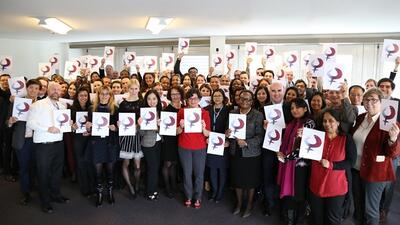Empower women to power trade and sustainable development - Patricia Francis speaks at US Mission in Geneva to mark International Women's Day (en)
Patrica Francis, ITC's Executive Director, joined Ambassador Betty E. King, the Permanent Representative of the United States of America to the United Nations, Ms. Ruth Y. Goldway, Chairman of the United States Postal Regulatory Commission and Ms. Violette Ruppanner, President of the Organization of Women in International Trade (OWIT), at the US Mission in Geneva to debate how to optimise the effects of leveraging the power of Women's networks.
Networks such as the OWIT, and Women in Logistics and Delivery Services (WILDS) have been established at the national level for the specific purpose of effecting change. The question raised at last night's event was to discuss what lessons have been learnt and what strategies, tactics and alliances work to change policies and practices.
Ms. Francis stressed the need to empower women to power trade and sustainable development. She noted how research shows that whilst men spend 30 to 40 per cent of their income on their families, women who earn an income and also retain control over how it is spent invest 90 per cent in their families, which is effectively a greater investment in a country's future development.
The Executive Director outlined ITC's role in supporting SMEs in developing and transition economies to achieve export success. She noted how export success is linked to a positive impact on development and hence there is a need to ensure women are integrated into and derive economic benefit financially from ITC's work. Ms. Francis pointed to ITC's work in value chains, such as the Women in Coffee in Africa project as well as ITC's work with women entrepreneurs via the Women Exporters ACCESS! programme as being good examples of ITC working to empower women. Amongst other examples, the Executive Director also cited ITC's Global Platform for Action on Sourcing from Women Vendors, as a means to increase the share of corporate, government and institutional procurement secured by women vendors for the ultimate purpose of bringing greater economic benefit to women and their communities.
On the broader level, Ms.Francis focused on MDG 3, which aims to promote gender equality and empower women, by referring to a UN Development Group report from 2010 which noted how the third MDG interprets gender equality very narrowly and recognises that the targets and indicators used to frame that goal are too limited. To address this, she emphasised the need for a specific goal on women’s economic empowerment, with appropriate indicators that encompass not only employment but women’s entrepreneurship, and furthermore include an indicator on women’s retention of control over resources - and as such contribute to the aforementioned greater investment in their families’ development.






